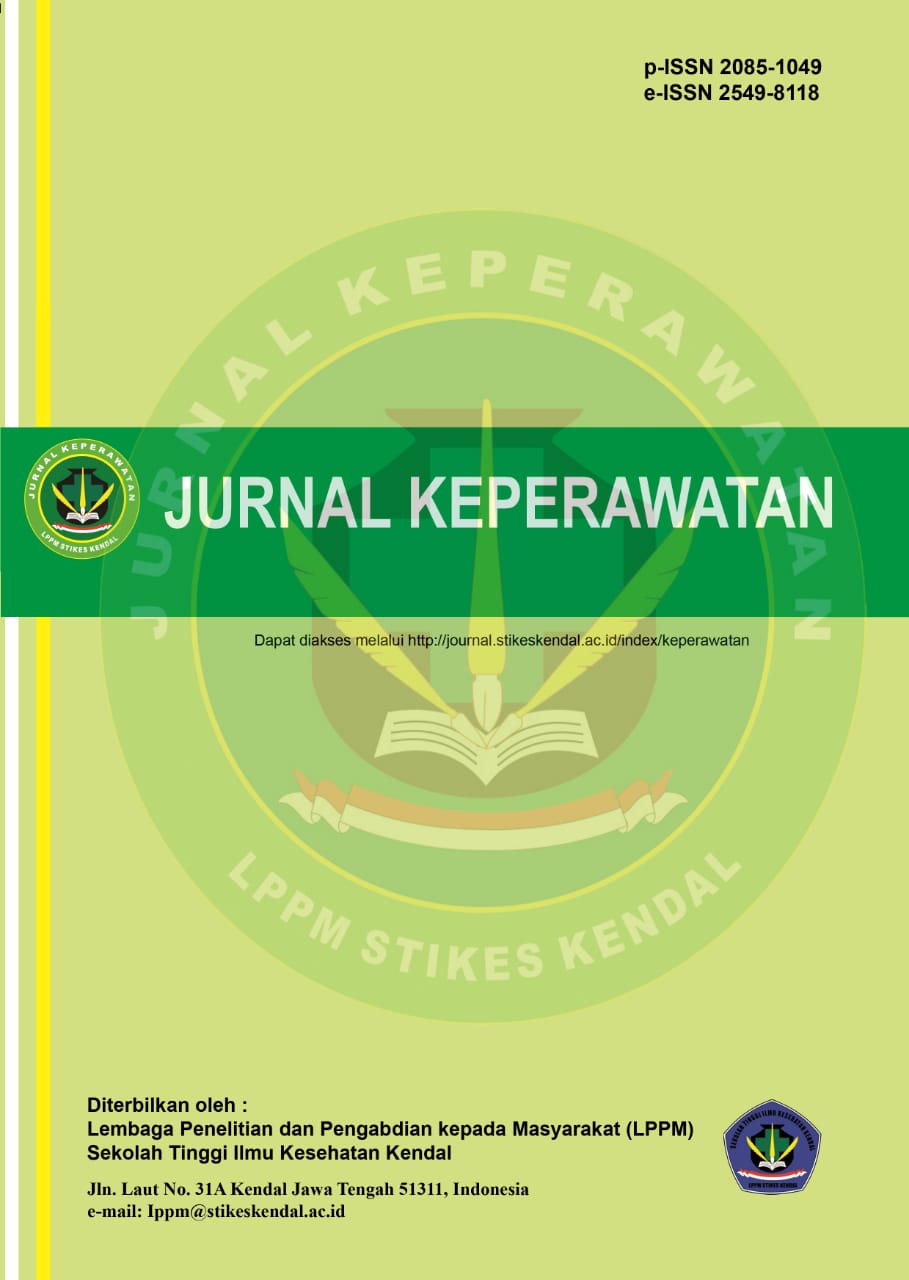Making Meaning Pengasuhan terhadap Kemampuan Keluarga Merawat Skizofrenia
DOI:
https://doi.org/10.32583/keperawatan.v16i4.2041Keywords:
kemampuan merawat, making meaning, pengasuhan, skizofreniaAbstract
Pengalaman keluarga merawat skizofrenia masih dianggap negatif dan keluarga tidak menyadari bahwa makna pengasuhan yang positif merupakan kekuatan bagi pemulihan skzifrenia. Penelitian ini bertujuan untuk mengetahui hubungan making meaning pengasuhan terhadap kemampuan keluarga merawat skizofrenia. Design penelitian kuantitatif dengan pendekatan cros-sectional. Sampel sebanyak 135 keluarga yang merawat skizofrenia dengan teknik purposive sampling. Pengumpulan data dengan kuesioner hert hope index (HHI), experience of caregiving inventory (ECI) pada validitas 0,689-0,833 (r-tabel 0,361) dan Cronbach alpha 0,885. Sementara Barthel Index dan Caregiving Tasks in Caring for an Adult with Mental Illness Scale (CTiCAMIS) dengan validitas 0,618-0,771 dan Cronbach alpha 0,861. Analisis data menggunakan Chi-Square dengan taraf signifikansi 95%. Ada hubungan making meaning pengasuhan dengan kemampuan keluarga merawat Pasien skizofrenia (p-value 0,000). Making meaning pengasuhan meningkatkan kemampuan keluarga merawat skizofrenia.
References
Agency of Health Research and Development. (2018). Report of Central Java Province in Basic Health Research 2018. In Ministry of Health of the Republic of Indonesia.
Akgül Gök, F., & Duyan, V. (2020). ‘I wanted my child dead’ – Physical, social, cognitive, emotional and spiritual life stories of Turkish parents who give care to their children with schizophrenia: A qualitative analysis based on empowerment approach. International Journal of Social Psychiatry, 66(3), 249–258. https://doi.org/10.1177/0020764019899978
Ashcroft, K., Kim, E., Elefant, E., Benson, C., & Carter, J. A. (2018). Meta-Analysis of Caregiver-Directed Psychosocial Interventions for Schizophrenia. Community Mental Health Journal, 54(7), 983–991. https://doi.org/10.1007/s10597-018-0289-x
Benjamin James Sadock, V. A. S. & P. R. (2017). Kaplan and Sadock’s Comprehensive Textbook of Psychiatry (10th ed.). Wolters Kluwer.
Bhandesa, A. M. (2019). Psikoedukasi kelompok kader kesehatan jiwa (k3j) dalam Pemberdayaan penderita skizofrenia di masyarakat. Jurnal Riset Kesehatan Nasional, 3(1), 112–117. http://ojs.itekes-bali.ac.id/index.php/jrkn/article/view/145/82
Campos, L., Cardoso, C. M., & Marques-Teixeira, J. (2019). The paths to negative and positive experiences of informal caregiving in severe mental illness: A study of explanatory models. International Journal of Environmental Research and Public Health, 16(19). https://doi.org/10.3390/ijerph16193530
Farran, C. J., Keane-Hagerty, E., Salloway, S., Kupferer, S., & Wilken, C. S. (1991). Finding meaning: An alternative paradigm for Alzheimer’s disease family caregivers. Gerontologist, 31(4), 483–489. https://doi.org/10.1093/geront/31.4.483
Fitryasari, R., Nursalam, N., Yusuf, A., Hargono, R., & Chan, C.-M. (2018). Predictors of Family Stress in Taking Care of Patients with Schizophrenia. Jurnal Ners, 13(1), 72. https://doi.org/10.20473/jn.v13i1.7762
Fitryasari, R., Nursalam, N., Yusuf, A., Hargono, R., Lin, E. C.-L., & Tristiana, R. D. (2021a). Development of a family resiliency model to care of patients with schizophrenia. Scandinavian Journal of Caring Sciences, 35(2), 642–649. https://doi.org/https://doi.org/10.1111/scs.12886
Fitryasari, R., Nursalam, N., Yusuf, A., Hargono, R., Lin, E. C. L., & Tristiana, R. D. (2021b). Development of a family resiliency model to care of patients with schizophrenia. Scandinavian Journal of Caring Sciences, 35(2), 642–649. https://doi.org/10.1111/scs.12886
Gorman, L. M., & Anwar, R. (2014). Neeb’s Fundamentals of Mental Health Nursing.
Grácio, J., Gonçalves-Pereira, M., & Leff, J. (2018). Key Elements of a Family Intervention for Schizophrenia: A Qualitative Analysis of an RCT. Family Process, 57(1), 100–112. https://doi.org/10.1111/famp.12271
Herth, K. (1992). Abbreviated instrument to measure hope: development and psychometric evaluation. Journal of Advanced Nursing, 17(10), 1251–1259. https://doi.org/10.1111/j.1365-2648.1992.tb01843.x
Iswanti, D. I., Nursalam, Fitryasari, R., Mendrofa, F. A. M., & Hani, U. (2023). Including families in schizophrenia treatment: a systematic review. International Journal of Public Health Science, 12(3), 1155–1164. https://doi.org/10.11591/ijphs.v12i3.22462
Iswanti, D. I., Nursalam, N., Fitryasari, R., Mendrofa, F. A. M., & Kandar, K. (2023). Factors related to family’s ability to care for schizophrenic patients. International Journal of Public Health Science, 12(2), 764–771. https://doi.org/10.11591/ijphs.v12i2.22635
Janardhana, N., Raghevendra, G., Naidu, D. M., Prasanna, L., & Chenappa, T. (2018). Caregiver Perspective and Understanding On road to Recovery. Journal of Psychosocial Rehabilitation and Mental Health, 5(1), 43–51. https://doi.org/10.1007/s40737-018-0108-2
Kaakinen, J. R., Gedaly-Duff, V., Coehlo, D. P., & Hanson, S. M. H. (2015). Family health care nursing. In Family Health Care Nursing: Theory, Practice and Research.
Ministry of Health of the Republic of Indonesia. (2018a). Main Result of Basic Heatlh Research. Riskesdas, 52.
Ministry of Health of the Republic of Indonesia. (2018b). Main Results Basic Health Research. Ministry of Health of the Republic of Indonesia, 1–582.
Patricia, H., Rahayuningrum, D. C., & Nofia, V. R. (2019). Relationship of Family Burden with Caregiver Ability in Caring for Schizophrenic Clients. J Health Med Saintika, 10(2), 45. https://doi.org/10.30633/jkms.v10i2.449
Szmukler, G. I., Burgess, P., Herrman, H., Benson, A., Colusa, S., & Bloch, S. (1996). Caring for relatives with serious mental illness: The development of the Experience of Caregiving Inventory. Social Psychiatry and Psychiatric Epidemiology, 31(3–4), 137–148. https://doi.org/10.1007/BF00785760
Van Es, C. M., Mooren, T., Zwaanswijk, M., Te Brake, H., & Boelen, P. A. (2019). Family Empowerment (FAME): Study protocol for a pilot implementation and evaluation of a preventive multi-family programme for asylum-seeker families. Pilot and Feasibility Studies, 5(1), 1–10. https://doi.org/10.1186/s40814-019-0440-7
Verity, F., Turiho, A., Mutamba, B. B., & Cappo, D. (2021). Family care for persons with severe mental illness: experiences and perspectives of caregivers in Uganda. International Journal of Mental Health Systems, 15(1), 1–10. https://doi.org/10.1186/s13033-021-00470-2
Yu, B. C. L., Mak, W. W. S., & Chio, F. H. N. (2021). Family involvement moderates the relationship between perceived recovery orientation of services and personal narratives among Chinese with schizophrenia in Hong Kong: a 1-year longitudinal investigation. Social Psychiatry and Psychiatric Epidemiology, 56(3), 401–408. https://doi.org/10.1007/s00127-020-01935-4
Zhou, D. H. R., Chiu, Y. L. M., Lo, T. L. W., Lo, W. F. A., Wong, S. S., Luk, K. L., Leung, C. H. T., Yu, C. K., & Chang, Y. S. G. (2020). Outside-in or Inside-out? A Randomized Controlled Trial of Two Empowerment Approaches for Family Caregivers of People with Schizophrenia. Issues in Mental Health Nursing, 41(9), 761–772. https://doi.org/10.1080/01612840.2020.1734992.
Downloads
Published
How to Cite
Issue
Section
License
Copyright (c) 2024 Jurnal Keperawatan

This work is licensed under a Creative Commons Attribution-NonCommercial-NoDerivatives 4.0 International License.




